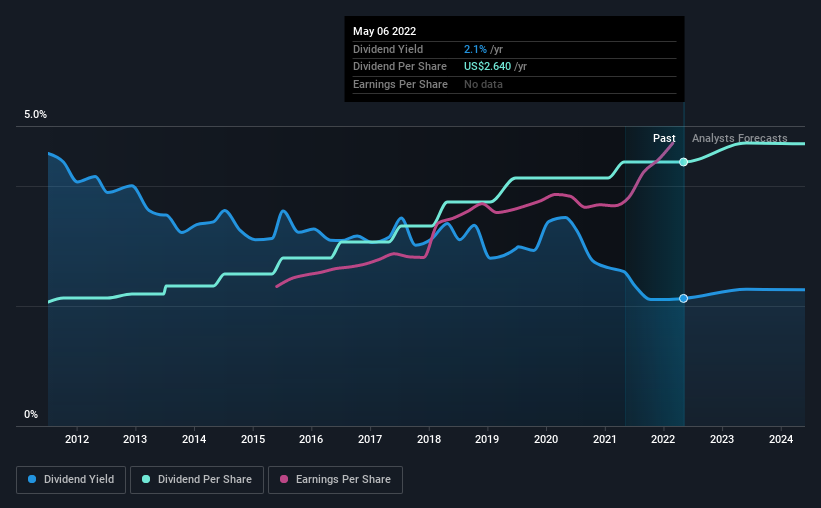Only Three Days Left To Cash In On Paychex's (NASDAQ:PAYX) Dividend
Regular readers will know that we love our dividends at Simply Wall St, which is why it's exciting to see Paychex, Inc. (NASDAQ:PAYX) is about to trade ex-dividend in the next three days. Typically, the ex-dividend date is one business day before the record date which is the date on which a company determines the shareholders eligible to receive a dividend. It is important to be aware of the ex-dividend date because any trade on the stock needs to have been settled on or before the record date. Meaning, you will need to purchase Paychex's shares before the 11th of May to receive the dividend, which will be paid on the 26th of May.
The company's upcoming dividend is US$0.79 a share, following on from the last 12 months, when the company distributed a total of US$2.64 per share to shareholders. Looking at the last 12 months of distributions, Paychex has a trailing yield of approximately 2.1% on its current stock price of $124.16. Dividends are a major contributor to investment returns for long term holders, but only if the dividend continues to be paid. So we need to investigate whether Paychex can afford its dividend, and if the dividend could grow.
See our latest analysis for Paychex
Dividends are typically paid from company earnings. If a company pays more in dividends than it earned in profit, then the dividend could be unsustainable. Paychex is paying out an acceptable 70% of its profit, a common payout level among most companies. That said, even highly profitable companies sometimes might not generate enough cash to pay the dividend, which is why we should always check if the dividend is covered by cash flow. Over the last year it paid out 67% of its free cash flow as dividends, within the usual range for most companies.
It's encouraging to see that the dividend is covered by both profit and cash flow. This generally suggests the dividend is sustainable, as long as earnings don't drop precipitously.
Click here to see the company's payout ratio, plus analyst estimates of its future dividends.
Have Earnings And Dividends Been Growing?
Businesses with strong growth prospects usually make the best dividend payers, because it's easier to grow dividends when earnings per share are improving. If earnings decline and the company is forced to cut its dividend, investors could watch the value of their investment go up in smoke. For this reason, we're glad to see Paychex's earnings per share have risen 12% per annum over the last five years. Paychex is paying out a bit over half its earnings, which suggests the company is striking a balance between reinvesting in growth, and paying dividends. Given the quick rate of earnings per share growth and current level of payout, there may be a chance of further dividend increases in the future.
Another key way to measure a company's dividend prospects is by measuring its historical rate of dividend growth. Since the start of our data, 10 years ago, Paychex has lifted its dividend by approximately 7.8% a year on average. We're glad to see dividends rising alongside earnings over a number of years, which may be a sign the company intends to share the growth with shareholders.
The Bottom Line
Should investors buy Paychex for the upcoming dividend? It's good to see earnings are growing, since all of the best dividend stocks grow their earnings meaningfully over the long run. That's why we're glad to see Paychex's earnings per share growing, although as we saw, the company is paying out more than half of its earnings and cashflow - 70% and 67% respectively. In summary, while it has some positive characteristics, we're not inclined to race out and buy Paychex today.
Wondering what the future holds for Paychex? See what the 17 analysts we track are forecasting, with this visualisation of its historical and future estimated earnings and cash flow
A common investing mistake is buying the first interesting stock you see. Here you can find a full list of high-yield dividend stocks.
Have feedback on this article? Concerned about the content? Get in touch with us directly. Alternatively, email editorial-team (at) simplywallst.com.
This article by Simply Wall St is general in nature. We provide commentary based on historical data and analyst forecasts only using an unbiased methodology and our articles are not intended to be financial advice. It does not constitute a recommendation to buy or sell any stock, and does not take account of your objectives, or your financial situation. We aim to bring you long-term focused analysis driven by fundamental data. Note that our analysis may not factor in the latest price-sensitive company announcements or qualitative material. Simply Wall St has no position in any stocks mentioned.

